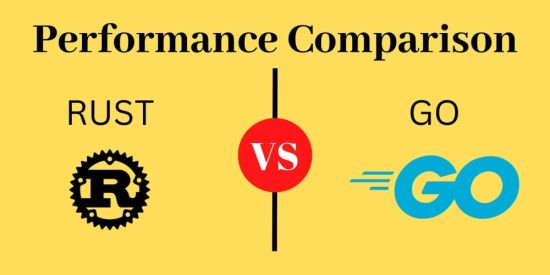TL;DR:
Go, developed by Google, is simple and readable, excelling in concurrency. Rust, from Mozilla, prioritizes memory safety and performance, making it great for systems programming. Go is simpler, Rust offers more control.
In performance, Go is efficient; Rust balances memory safety and performance.
According to Stack Overflow, 13.24% use Go, while 84.66% admire Rust.
Average salary: Golang – $92,760, Rust – $87,012.
Recommendation: Go is beginner-friendly, Rust for advanced control. Choose based on familiarity and project complexity.
Introduction
Go, developed by Google in 2007, emphasizes simplicity, efficiency, and readability. It excels in concurrent programming and scalability, with a straightforward syntax, making it popular for building distributed systems and web servers.
In contrast, Rust, introduced by **Mozilla** around 2010, prioritizes memory safety and performance. Ideal for systems programming, Rust’s ownership system ensures memory safety without compromising performance, making it a powerful choice for building reliable and efficient systems.
Features
Go:
- Simplicity and Readability: Go is designed with a straightforward and readable syntax, prioritizing ease of understanding and code maintenance.
- Efficiency: Go achieves efficiency through a garbage collector, managing memory automatically to optimize resource utilization.
- Concurrency: Go stands out for its built-in support for concurrent programming, offering goroutines and channels that simplify the development of scalable applications.
Rust:
- Memory Safety: Rust places a robust emphasis on memory safety, incorporating features such as ownership and borrowing alongside a borrow checker to prevent common memory management errors.
- Performance: Rust focuses on performance with zero-cost abstractions and low-level control, making it suitable for high-performance applications without compromising safety.
- Fearless Concurrency: Rust provides a system for fearless concurrency, ensuring thread safety and empowering developers to write reliable and efficient concurrent code, particularly beneficial in systems programming scenarios.
In comparison, while Go excels in simplicity, readability, and efficient concurrency, Rust distinguishes itself with a strong commitment to memory safety, high performance, and a fearless approach to concurrency in the context of systems programming.
Performance
In the ever-evolving landscape of programming languages, developers often seek the right balance between simplicity, efficiency, and performance. In this exploration, we’ll compare the performance of Go and Rust by measuring the time it takes to execute a seemingly simple task: printing numbers from 1 to 1 million.
Go: A Symphony of Simplicity and Concurrency
package main
import (
"fmt"
"time"
)
func main() {
startTime := time.Now()
for i := 1; i <= 1000000; i++ {
fmt.Println(i)
}
duration := time.Since(startTime)
fmt.Println("Execution time:", duration)
}
Execution time: 240.3113184s
Rust: A Dance of Safety and Performance
use std::time::Instant;
fn main() {
let start_time = Instant::now();
for i in 1..=1000000 {
println!("{}", i);
}
let duration = start_time.elapsed();
println!("Execution time: {:?}", duration);
}
Execution time: 313.9177696s
After running these programs separately, we observed the execution times. While the specific times may vary based on the environment and hardware, this simple experiment provides a glimpse into the relative performance of Go and Rust for a basic task.
In our test, Go demonstrated its efficiency in handling the task, leveraging its simplicity and built-in concurrency support. Rust, with its strong focus on memory safety and performance, showcased its capabilities even in a seemingly straightforward scenario.
It’s important to note that performance considerations extend beyond a single task, and the choice between Go and Rust should be based on the specific requirements of your project. Whether you lean towards the simplicity of Go or the power of Rust, these languages offer unique advantages that cater to diverse programming needs.
Developer Opinion
In May 2023, more than 90,000 developers participated in Stack Overflow’s annual survey, sharing insights into their learning methods, skill enhancement strategies, and tool preferences.
Among the 87,585 responses analyzed, 11,596 individuals, representing 13.24% of the respondents, reported using Go in the past year.
And, 11,429 participants, equivalent to 13.05%, indicated their usage of Rust over the same period.
Apart from documenting the technologies developers utilized in the past year, the survey also delves into the tools currently in use and those developers aspire to continue using in the future.
According to the survey findings, Rust is highly favored, with 84.66% of developers expressing admiration for the language, and 30.56% expressing a desire to continue using it. Go, while still popular, shows slightly lower figures, with 62.45% admiration and 20.59% expressing a desire to use it further.
As per the survey results, the average salary for a Golang developer is reported to be $92,760, while Rust developers have an average salary of $87,012. These figures provide insights into the compensation trends within the respective developer communities, with Golang developers commanding a slightly higher average salary compared to their Rust counterparts.
Read the whole survey here –
My Recommendation
If you’re new to coding, Go is a great pick with its simple and beginner-friendly features. Its clear syntax makes learning the basics a breeze, making it an ideal choice for those starting their programming journey.
On the flip side, if you’re looking for a more advanced language that provides better control and performance, Rust is a compelling option. Despite a steeper learning curve, Rust’s emphasis on memory safety and concurrency offers a powerful toolkit for experienced developers tackling complex projects.
Ultimately, the choice between Go and Rust hinges on your familiarity with coding and the complexity of the projects you aim to undertake. Go offers simplicity, while Rust provides a deeper understanding and greater control for those ready for a more advanced coding experience.
Follow for more such content. @mukeshkuiry 🙂
Do let me know your favorite programming language in the comment below.










